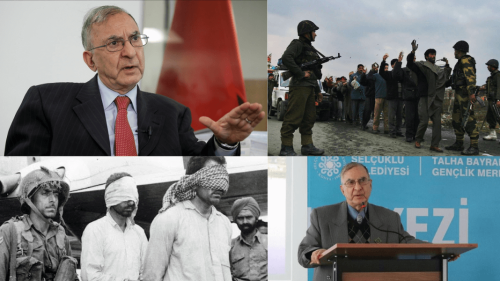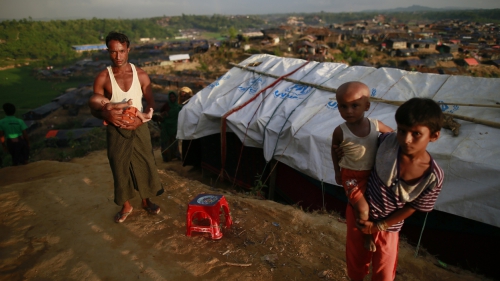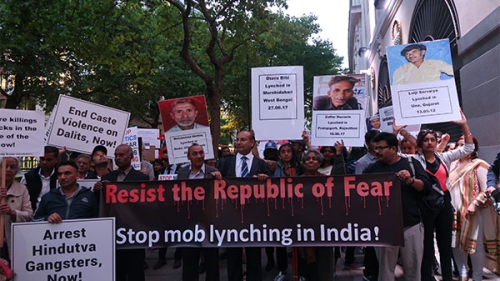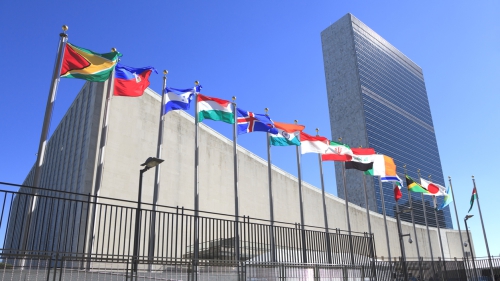Kashmir - My lost country
Not long ago, somebody asked me what kind of stories I wrote. Obituaries came to mind. As a reporter in Kashmir I have been literally writing obituaries for the past 10 years; only the characters and places change, the stories are always the same, full of misery and tears.
And when in October last year I got a chance to leave Kashmir, I hoped for a change. Every human being has a threshold for pain and agony. I felt mine had been reached. I wanted to escape. But within days, Kashmir was in the headlines and although I was thousands of miles away, I found myself in the middle of it all again.
I was born in Kashmir. I grew up in its apple orchards and lush green meadows, dreamed on the banks of its freshwater streams. I went to school there, sitting on straw mats and memorizing tables by heart. After school my friends and I would rush halfway home, tear off our uniforms and dive into the cold water. Then we would quickly dry our hair, so our parents would not find out what we had done. Sometimes, when we felt especially daring, we would skip an entire day of school to play cricket.
My village lies in the foothills of the Himalayas. During summer breaks, we would trek to the meadows high in the mountains carrying salt slates for the family cattle, sit around a campfire and play the flute for hours. The chilling winter would turn the boys and girls of our small village into one huge family -- huddled together in a big room, we would listen to stories till late into the night. Sipping hot cups of the traditional salt tea, the village elder who had inherited the art of storytelling would transport us to the era of his tales. He had never been to school but he remembered hundreds of beautiful stories by heart. Kashmir was like a big party, full of love and life. Today death and fear dominate everything.
I was in Kashmir too when the first bomb exploded in 1988. People first thought it was the outcome of a small political feud, although everybody knew the pot was boiling after years of political discontent. Then that September a young man, Ajaz Dar, died in a violent encounter with the police. Disgruntled by the farce of decades of ostensible democracy under Indian rule, a group of Kashmiri young men had decided to fight. They had dreamt of an independent Kashmir. Although this young man was not the first Kashmiri to die fighting for this cause, his death was the beginning of an era of tragedy.
Separatist sentiment had been dominant among Kashmiris since 1947. But it was not until 40 years later that most of the youngsters opted for guns against Indian rule, in reaction to the government-sponsored rigging of the assembly polls, aimed at crushing dissent.
It is not a surprise that India's most wanted Pakistan-based Kashmiri leader, Syed Salahuddin, contested that assembly election from Srinagar, nor that, unofficially, he was winning by a good margin. When the elections were rigged, he lost not only the election but faith in the process as well. His polling agents and supporters were arrested and tortured; most of them later took up arms.
Although the reasons for joining the freedom movement varied from person to person, the majority of Kashmiris never felt that they belonged to India. What had been a relatively dormant separatist sentiment was finally exploding into a fully-fledged separatist uprising.
I too wanted to join, though I didn't know exactly why or what it would lead to. Most of us were teenagers and had not seriously thought about the consequences. Perhaps the rebel image was subconsciously attracting us all.
I also prepared for the dangerous journey from our village in north Kashmir to Pakistan-administered Kashmir where all the training camps were. I acquired the standard fighter's gear: I bought the Wellington boots, prepared a polythene jacket and trousers to wear over my warm clothes, and found some woolen cloth to wrap around my calves as protection from frostbite. Fortunately or unfortunately, I failed. Three times a group of us returned from the border. Each time something happened that forced our guide to take us back.
As the days and months passed, and as the routes the fighters took to cross the border became known to Indian security forces, the bodies began to arrive. Lines of young men would disappear on a ridge as they tried to cross over or return home. The stadiums where we had played cricket and football, the beautiful green parks where we had gone on school excursions as children, were turned into martyrs' graveyards. One after another, those who had played in those places were buried there, with huge marble epitaphs detailing their sacrifice. Many had never fired a single bullet from their Kalashnikovs.
One day, I counted my friends and classmates in the martyrs' graveyards near our village. There were 21 of them. I could feel the smiling face of Mushtaq, whom I had known since our schooldays. He was killed in April 1993. His mother could not bear the pain and lost her mental balance. For all these years, she has been wandering around the villages carrying the shirt he wore on the day of his death.
Another friend, Javaid, was his parents' only son. Extremely handsome, he was obsessed with seeing change in Kashmir. The day he died, he was wearing my clothes. He had come to our house in the morning and changed there. He was 23, and even six hours after his death, when they took him for burial, blood still oozed out of his bullet wounds. I will never forget the moment when I lifted the coffin lid away from his face: there was that usual grin. For a moment, he seemed alive to me.
Javaid's sister was to have been married 15 days later but the shock of his death gave her a heart attack. She died a few days before what would have been her wedding day.
Today, there are more than 500 martyrs' graveyards dotting Kashmir, and every epitaph standing on a grave tells a story -- a tragic story of my generation. Engraving epitaphs has become a lucrative business.
The Indian government held state elections in 1996 apparently aimed at ensuring a representative government in Kashmir. But actually it was nothing more than a farce. The security forces herded people to polling stations and even conducted "nail parades" to check -- by the indelible ink pasted on the nail of the forefinger -- that people had voted.
The man who represents Kashmir -- not only in New Delhi, but also across the world as India's junior foreign minister -- is Omar Abdullah, the son of Kashmir Chief Minister Farooq Abdullah. He received just five percent of votes in his constituency -- after coercion by the police and the security forces -- and he won the elections. Who he does actually represent, nobody knows.
I have been a witness to all this. I have seen Kashmir change. I still remember my grandmother worrying whenever the sky turned red. "Murder has been committed somewhere," she would say. Now that suspicion can no longer be reserved for red skies: the daily death toll is 20.
Kashmir used to be known as a crime-free state. One of my neighbors was a senior police officer in the mid-1980s; he once told me that the average yearly murder rate in Kashmir was three or four. Today, if three people perish in a day, it is considered peaceful.
I have been fortunate enough to be safe, but my family and relatives have not been that lucky. My younger brother Mudabir was picked up in 1994 on suspicion of militancy, and it took us a month just to trace his whereabouts. We divided up the entire Kashmir valley among our family members. Every morning, each one of us would do the rounds of the security force camps to look for him.
My mother had never been to a police station in her entire life, but by the time she finally located my brother, she knew almost every military camp around Srinagar.
And by the time the ,security for,ces were convinced of his innocence and released him, he had already been tortured so much that he spent the next two months in bed.
It is now seven years since his release, but he still has nightmares and the mere sight of a soldier sends shivers down his spine. A late-night knock at the door still gives him goose pimples, and sends his heart rate soaring. But this is not exceptional any more in Kashmir.
A cousin's husband bled to death after he was caught in the crossfire while coming out of mosque one evening. He could have been saved had he reached the hospital in time. But the security forces did not allow the family to come out of their house and take him to the hospital, and there was no other way to seek medical help. He bled to death crying for help, and his wife, mother and younger brother could do nothing but watch their own helplessness. A boy was born in the family four months after his death.
By 1992, there were hardly any young men left in the few villages in north Kashmir around my home. Many had joined the freedom movement. Some had died, while others had gone underground; some had surrendered and become counter-insurgents and were part of the pro-government militias. Many had migrated to the urban area of Srinagar city, which was then deemed comparatively safe.
I decided to leave my village to move to Srinagar and join Kashmir University. I was so desperate to leave that I applied to almost all the departments. It was mere chance that I got into journalism. And when I started writing about the war later that year, I felt that I had been part of this tragic story from the beginning. I knew the fighters and the mukhbirs (the police informers); those who surrendered and those who did not; those who faced death because they had a dream and those who were sacrificed by mere chance, neither knowing nor understanding the issues at stake; those who believed they were fighting a holy war and those who joined for unholy reasons. But, as it turned out, there was more to the story.
My first assignment as a reporter for Indian Express was to visit a city police station and collect information regarding some corpses lying there. I accompanied a few local photographers, who began taking pictures as I stared at the six bullet-riddled bodies. They were in terrible condition: blood-soaked clothes, entrails exposed, faces unrecognizable.
That evening, I was haunted by the picture of bodies lying in a pool of blood -- even a drink of water reminded me of blood. I couldn't sleep for days; corpses haunted my dreams.
A few months later I arrived at the site of a massacre to find wailing women and unshaven men sitting in huddles. Bodies lay scattered, like rag dolls discarded by careless children. I felt a lump growing in my throat, my legs felt heavy. I felt incredibly tired and wanted to throw down my notebook and sit silently with the mourners. The noise of the camera shutters invaded my private thoughts, forcing me to think about the story I had to write.
Over the years, writing obituaries became a routine. When violence rules the day, there is nothing but tears to jerk out of the reader's soul. If I avoided writing about the gory details of death, I would end up writing about orphans or widows. In the process, my reactions to such incidents also began to change. I could no longer relate to these tragedies. Now killings meant stories and bylines, and there was satisfaction to be found in penning them, even if I knew the victims personally.
I belong to Kashmir's cursed generation -- the youth of the 1990s. I have lived all these troubled years in Kashmir and am still well and alive. But in the process my tears have dried up. I have lost normal human feelings to the adventures of reporting day-to-day violence in my country. I am immune to the death of my own people; I have developed an inability to mourn.
And it seems that the outside world ,too is unable, to feel the pain of Kashmir. After more than 50,000 deaths, there still appears to be no headway toward peace. The international community needs to resolve issues between India and Pakistan. It is not only important in order to avoid a nuclear conflict: it is imperative to end the suffering of the Kashmiri people. (The Observer)
The Author is the associate editor of Kashmir Images, a weekly news magazine.
Related Suggestions
You lived happily till somebody fought against India...I guess was it more of somebody rigging the polls and pakistan getting bugged and sponsoring ur so called librators to take the gun.
This entire issue is too polarized my belief is that if you want freedom you should distance yourself from Pakistan. For as long as u seek their support or approve of it there can be no freedom.
Like Gandhi told "The means of achiving something is as important as the cause"
Politicians always have a way of igniting religious passions and let the people do the dirty work for them.
One thing I am sure every Indian (not just Hindus) will shed their last drop of blood before you see Kashmir as part of Pakistan. And in that process Pakistan will be left fighting for a independent Pakistan and the world figures will only be too happy that India did the dirty job for them.
Independent Kashmir is just about taking the right steps.
Wars and associated killings are always painful. Millions have perished in many wars around the world. But I as an Indian cannot forget that pro Pakistani Muslims starting with Jinnah were the cause of terrible bloodshed and partition. Pr Pakistani muslims are till today, even after 50 years, causing trouble in India. The conclusion drawn is that thee are very evil people who understand the language of violence and infact violence is part of their lives. Their lives revolve around religion which they are willing to foist on others. Other political forces like VHP are only a reaction to these pro Pakistani elements. Violence, agression, conquest is not part of Indian culture for centuries or thousands of years. It is upto the Kashmiri people to reject violence. If Kashmir were to become part of Pakistan, Kashmiris, like other miniorities including Shia's in Pakistan will be considered 2nd class citizens and their resources and land will be looted by the Pakistani establishment. If KAshmir were to become independent, it will be subject to so many foreign political presures and coupled with lack of resources, that its people will effectively become a week people in the world. Indians repect Kashmiri people more than anyone else in the world. Political and adminsitrative mismanagement in Kashmir is not unique to Kashmir and it is typical of many 3rd world countries. There had been no explotation of kashmrirs by Indians. Like Pakistan, we did not give away part of Kashmir to China! Think again if Pakistani's will really love you. Dont you know what happenned to Bangaldeshis? Think again if being Muslim isn't the only reason why you want to seperate from India. And that reason I find abhorent.

















